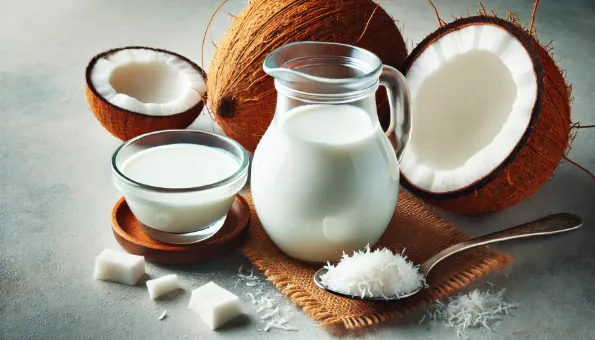Coconut Milk: Creamy, Dairy‑Free Source of MCTs & Manganese
A splash of coconut milk lends velvety richness, medium‑chain triglycerides and tropical aroma to curries, smoothies and desserts—but it’s high in saturated fat, so portion wisely.

What Is Coconut Milk?
Coconut milk is made by blending grated coconut flesh with warm water, then straining the liquid. **Full‑fat canned** milk contains ~17–24 % fat; **light** versions are diluted.
Nutrition (per 100 g full‑fat)
| | Amount | %DV |
|---|---|---|
| Calories | 230 kcal | — |
| **Fat** | 24 g | 31 % |
| – Sat Fat | 21 g | 105 % |
| Carbohydrate | 6 g | — |
| Protein | 2 g | 4 % |
| **Manganese** | 1.5 mg | 65 % |
| Copper | 0.3 mg | 33 % |
Potential Benefits
- **Medium‑chain triglycerides (MCTs)**—caprylic & lauric acids may fuel rapid energy and support ketogenic diets.
- **Dairy‑free & lactose‑free**: suitable for vegan, paleo and allergy menus.
- Rich mouthfeel allows you to cut butter or cream in sauces.
Drawbacks & Precautions
- High in saturated fat—stick to ¼ cup (60 ml) serving.
- Canned products may contain **BPA‑lined** tins—choose BPA‑free brands.
- Separates under refrigeration; shake or blend before use.
Culinary Uses
- Simmer into Thai green curry or Sri Lankan dal.
- Whip chilled thick cream for vegan whipped topping.
- Blend with mango for lassi‑style smoothie.
- Replace 50 % of dairy milk in pancakes for subtle coconut flavor.
Storage Tips
Unopened cans keep 24 months at ≤25 °C. After opening, refrigerate in glass jar and use within **4–5 days** or freeze in ice‑cube trays for 3 months.
Sustainability Notes
Coconuts grow on perennial trees—low tillage, but supply chains face labor concerns. Look for **Fair‑Trade or Rainforest Alliance** certification.
Key Takeaways
✔︎ Dairy‑free MCT source (65 % DV manganese)
✖︎ 21 g sat fat /100 g—measure portions
✔︎ Versatile in sweet & savory cuisine.
- 1. Coconut Milk

